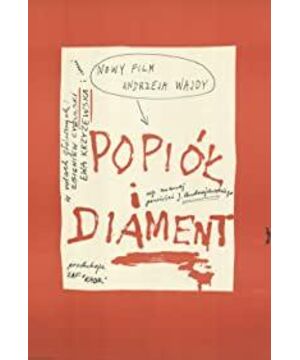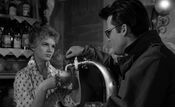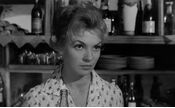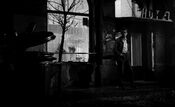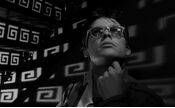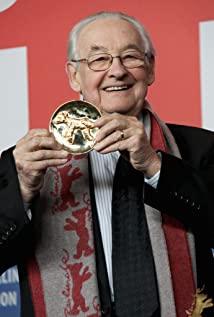War and Peace
The film focuses on the period of less than 24 hours from the day of victory in the war (Germany declares its unconditional surrender) to the next morning, but this short period of time clearly divides two completely different histories: war and peace. Ironically, what the movie began to show us was not peace, but an assassination in broad daylight. Machik and Unji ended up killing two people cleanly. What's more ironic is that they soon learned that they had killed the wrong person. Those two were not the chairman of the Communist Party but only two cement factory workers. The beginning of the movie is very exciting. Not to mention metaphors such as the cross, the little girl, and the body of the assassin’s body on fire. The appearance of the two protagonists not only succinctly explain the characters’ personalities, but also has a metaphorical effect: Angie tells Machik that the target is coming. Chick was lying leisurely on the lawn, and when he heard the voice of his companion, he immediately got up and took the gun. If Macchik resting on the lawn brings the audience a peaceful mood, then Macchik who suddenly picked up the gun brought the audience into the shadow of war. The time of peace is so short on this special day. Will New Poland arrive as promised with the dawn of dawn? Macchik will lead us through a thrilling night, where the past and the future, ideals and reality, conspiracy and love will be entangled with each other, and a nation will have to make destiny decisions.
The main part of the film is unfolded in a small hotel. Vajda gathered all kinds of people from assassination organizations, Communist Party chairmen, democrats, upper-class nobles, and lower-class people to welcome the bright night after a long period of darkness. In this special period of social transformation, various contradictions will alternate between historical reality, national consciousness, and individual consciousness. The choice of different political paths and the confrontation of various political ideas, but the uncertainty of history and the future make all this seem so funny, people can only grasp the present. Compared with the peace that people expect, going from one war to another is a more certain possibility. In the face of the unpredictable future, everyone can only serve as the victims of idealism. For a new Poland, in order to regain hard-won freedom (Poland just achieved full autonomy in 1918). Struggling between reality, obedience and resistance.
The portrait of Stalin appears in the background at least three times in the film. They are tilted or placed upside down. This is a perfect footnote to the era of Gomulka's "non-Stalinization" and implies the arrival of crisis.
Son and father
The dramatic tension between Machik and the Communist chairman Shukatz he is about to assassinate is the most fascinating plot setting of this movie. The manslaughter at the beginning of the movie hinted at a kind of fate, and then they came to the same hotel to deepen the sense of fate, and the only three meetings that finally fulfilled this fate. Shukatz is portrayed as an amiable father: in appearance and action. He asked about his son as soon as he returned, but his late wife's sister (an anti-communist) told him that the child was missing. What we see from these scenes is not the chairman of the Communist Party but a father with a 17-year-old son. The first and second meeting with Marchick were plots where he borrowed fire from Marchick to light a cigarette, and the two similar plots implied completely different themes. The first time was the assassin and the assassin, and the second time was the collision of different values (Schukatz represents a new order, and Machik symbolizes the past). The first time was with Machik and Unji, and the second time with Christina. The previous time he was still in a kind of chaos, the next time he began to think about what life he really wanted. But when he has no time to choose, he has to face Shukatz again, this time it will change everything.
What's interesting is that Schukatz's son is 17 years old and Machik lives in room 17. Schukatz’s son has the same political stance as Machik. Schuckatz’s son was arrested, and Schuckatz was assassinated by Machik on the way to see his son. There are also hints in the assassination process: Machik quickly surpassed Schukatz, he became the end of Schukatz's advancement (originally his son's), and Machik suddenly turned around and fired. It's not the same. (The victim fell backward after being shot last time, but this time he fell forward) Shukatz fell into Machik's arms. In this scene, the role of Schukatz's "father" and the role of Machik's "son" establish a mysterious connection. This connection cannot be detected in the play, but the audience feels it strongly. It can be said that Vaida completed a Hamlet-style fable here, killing his father and replacing his father's position. Mack is like the Danish prince who transformed a revenge into a search for the ultimate meaning of life. He used an assassination to marty his idealism. Shukatz projected the double mirror image of Macchik's enemy and his father, and he completed a painful self-explanation. The splendid fireworks that suddenly appeared in this scene ended the assassination. The fireworks blooming in the night sky were so beautiful, and the corpse that fell on him was so lonely in the night. National holidays have become personal deaths, and the individual's status in cruel political struggles is so small. The fleeting fireworks also revealed the inevitable instantaneity of worldly things. Machik escaped in the sky full of fireworks. Who would dare to say that it would not be him who fell to the ground next time?
Survival and death
Machik is a survivor of the old age. The cup he carried with him and the sunglasses he had almost never taken off became his contact with the past and trace the history. When he told Christina that it was because of the Warsaw Uprising that he did not take off her glasses (Wajda’s last work "The Sewer" is a tragic story in the Warsaw Uprising), we knew that he was not ready to go with him. Say goodbye. Machik still lives in the dark sewer. After all, he is not an opportunist like Ziglowski. He is a lonely soul who has long been infected by death. He bears the pain and misfortune of a nation. Looking for, looking for identity, looking for identity in the new society. People often call Machik a typical "anti-hero", but in fact he is not an "anti-hero." The concept of "anti-hero" originated from the French New Wave. When portraying the protagonist, he deliberately "avoided the sublime", and Hollywood later carried it forward. An important reason why Mack is not an "anti-hero" is that he does not keep a distance from reality and society. He does not have the capital to "bystander". On the contrary, he is trapped in reality and influenced by the times. He is not an existentialist who "does himself well", but an idealistic fighter who "helps the world". Based on this, Machik is not an "anti-hero", but a real hero.
Wajda didn't deliberately set any moral boundaries when he created the characters. Whether it was Machik or Schukatz, they are noble, they have traces of the past, and they are not afraid to dedicate themselves to politics.
The end of the film is another legend. After Machik bid farewell to Christina, he inadvertently saw a train passing behind him when Unji beat Ziglowski. The train that went away symbolized that Machik had no way to go. (The reality is that Zibulski himself died accidentally while catching a train.) When he was injured by the police, the bright red blood mark on the white cloth became the best interpretation of the Polish flag. The martyrs exchanged their blood for the new Poland. Machik’s death left the audience with a big paradox. A person who fought for a free New Poland did not have the freedom to choose. He had to kill people. He did not have the right to choose love. Freedom is a ternary concept, the subject of freedom, the intervention and obstacles in the process, and the final goal. Machik was fighting for freedom, but after overcoming intervention and obstacles (German and Schukatz), he found that the originally clear goal was blurred and disappeared. This is true for Macchik, and how is it not true for Poland as a whole? A country without a target is terrible, and it is destined to have no way out. In the movie, Vaida passes through the hotel’s long and narrow stairs, trash cans, and coffins, so that the imagery of moths to the fire seen by Schuckatz’s son alludes to death. This person and this country are waiting to be redeemed.
Ashes and diamonds
Ashes and diamonds are two diametrically opposed objects. We can see this opposition on the macro and micro levels of the movie.
From a macro point of view, there are three clearly comedic passages in the movie, and we can regard them as "diamonds". They were the conversations between the old editor and Ziglowski at the bar; Marchik and Christina were dating in the room because of the bullets that Marchik accidentally dropped before looking for them; Marchik helped Christie in a small church Na repaired the broken heel. But we soon discovered that this comic scene quickly transitioned into an "ash" tragedy. Ziglowski later lost control at the banquet; Machik recalled his painful past; saw the two cement factory workers he killed by mistake in the church.
Microscopically, fireworks and corpses, violets and trash cans•••••• When Christina reads Lolvert’s verse: “The eternal moment of victory shines in the depths of the ashes. It is the remaining diamond.” She was Macchik’s diamond, which was confirmed by the fact that Macchik fell on a huge garbage factory.
One of the scenes in the film that touched me the most was that Christina opened a small window in the morning, and the sun of the new day came in. Although it only illuminates a small part of the house, it is hope and the future after all, March. K just hurriedly came to say goodbye and left with his back to the sun. Their love ended up being a one-night stand, and that little glimmer would not shine into Mack’s gloomy inner world. But we also saw the old porter unfolding the Polish flag placed in the dark corner, holding the flag and walking outside to welcome the birth of a new Poland. The celebration in the house has just begun. People danced with expressionless faces. Christina was also dragged into the dark dance floor. The future of the country was still dark and unclear, and the freedom of the nation was still out of reach.
The people who accompanied Ojinsky's "Goodbye, Motherland" danced gracefully.
Goodbye, Macchik; goodbye, Cibulski,
goodbye, motherland, goodbye, Poland
View more about Ashes and Diamonds reviews


